必修二Unit 1 Cultural relics语法 非限制性定语从句 课件(17张ppt)
文档属性
| 名称 | 必修二Unit 1 Cultural relics语法 非限制性定语从句 课件(17张ppt) |
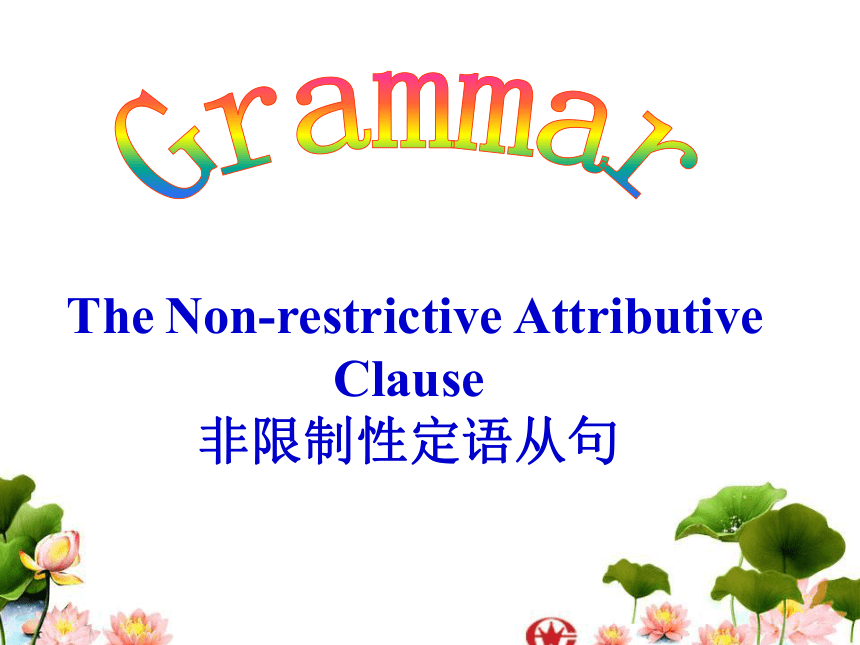
|
|
| 格式 | zip | ||
| 文件大小 | 327.3KB | ||
| 资源类型 | 教案 | ||
| 版本资源 | 人教版(新课程标准) | ||
| 科目 | 英语 | ||
| 更新时间 | 2021-11-09 17:35:42 | ||
图片预览

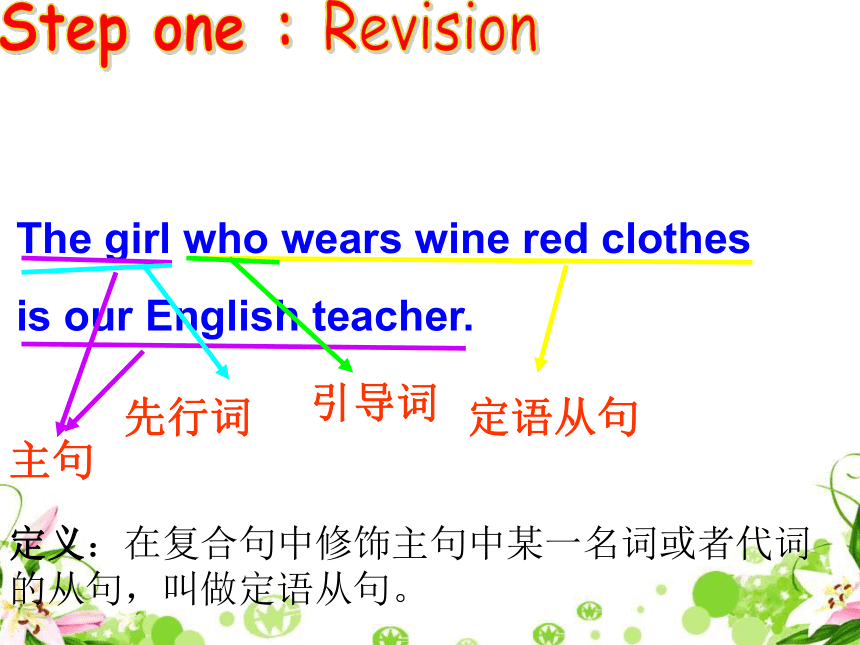
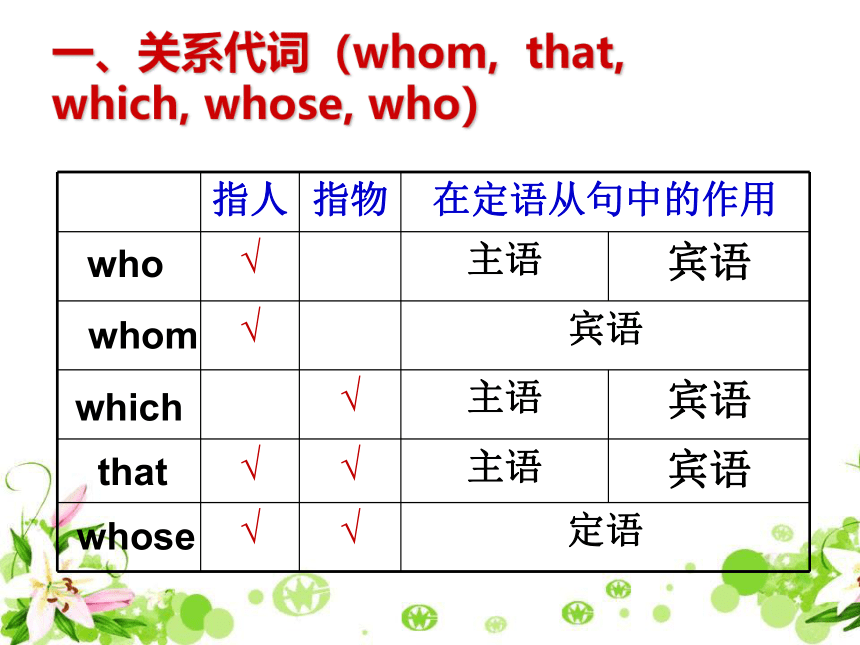
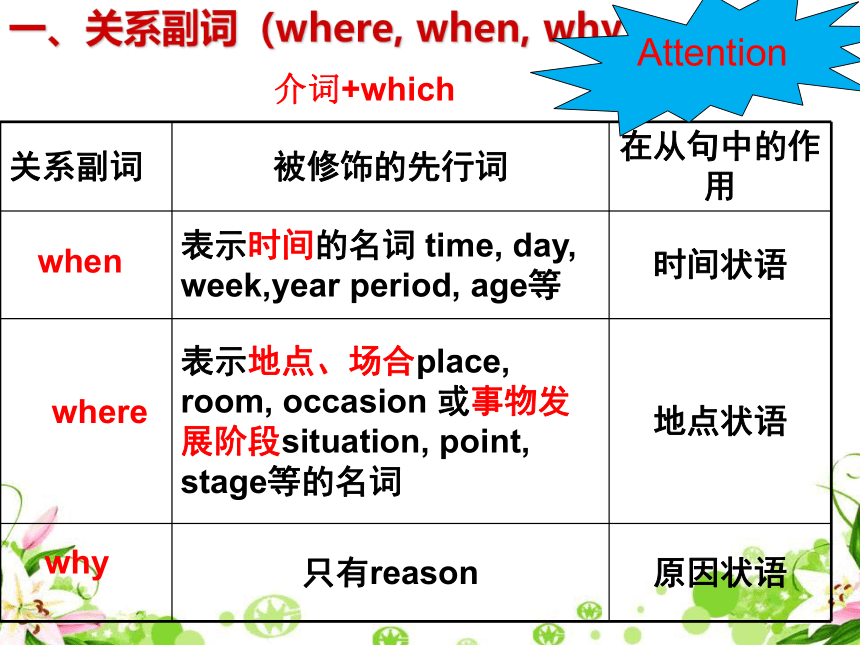
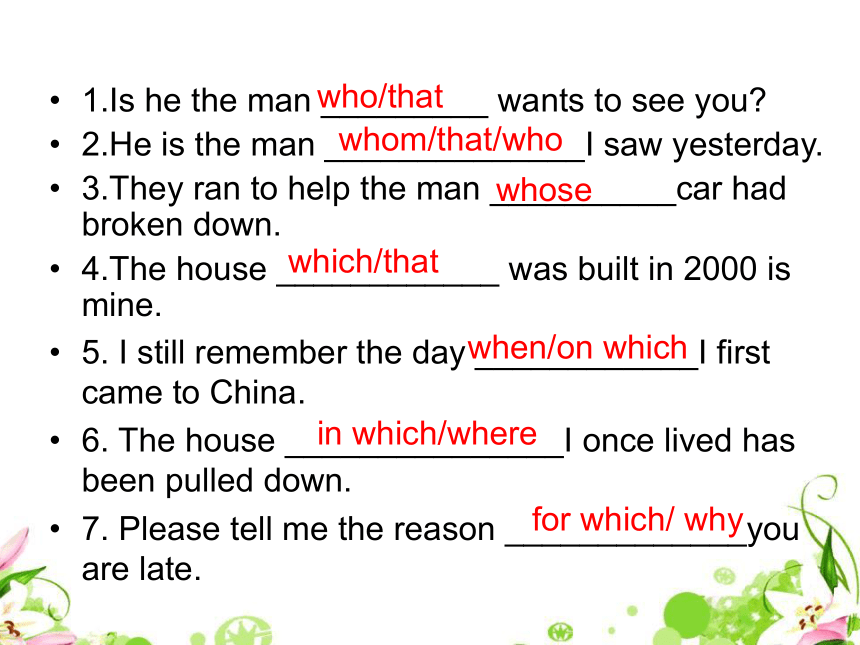
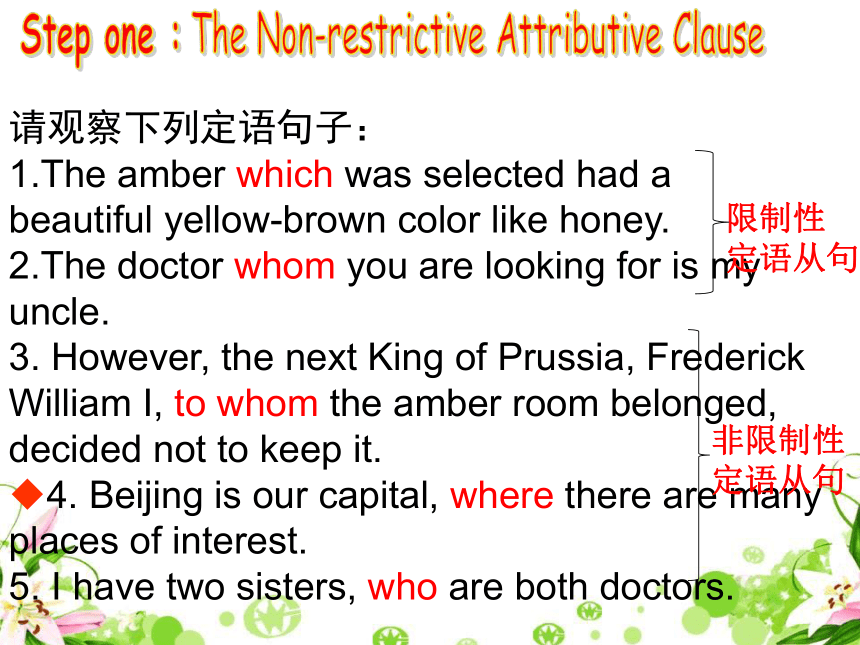
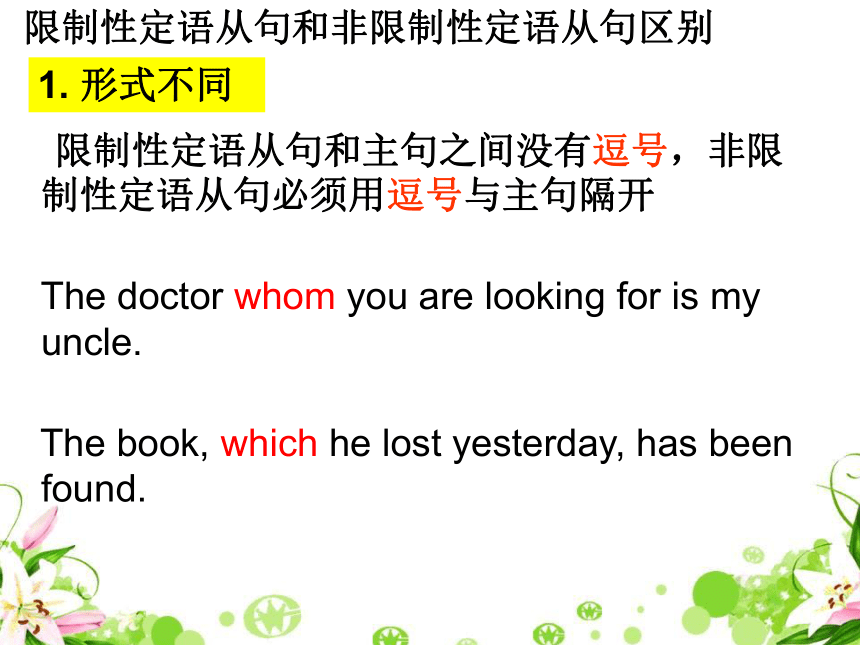
文档简介
(共17张PPT)
Grammar
The Non-restrictive Attributive Clause
非限制性定语从句
定义:在复合句中修饰主句中某一名词或者代词的从句,叫做定语从句。
The girl who wears wine red clothes
is our English teacher.
主句
引导词
先行词
定语从句
指人 指物 在定语从句中的作用
√ 主语 宾语
√ 宾语
√ 主语 宾语
√ √ 主语 宾语
√ √ 定语
一、关系代词(whom, that, which, whose, who)
who
whom
which
that
whose
一、关系副词(where, when, why)
关系副词 被修饰的先行词 在从句中的作用
表示时间的名词 time, day, week,year period, age等 时间状语
表示地点、场合place, room, occasion 或事物发展阶段situation, point, stage等的名词 地点状语
只有reason 原因状语
when
where
why
Attention
介词+which
1.Is he the man _________ wants to see you
2.He is the man ______________I saw yesterday.
3.They ran to help the man __________car had broken down.
4.The house ____________ was built in 2000 is mine.
5. I still remember the day ____________I first came to China.
6. The house _______________I once lived has been pulled down.
7. Please tell me the reason _____________you are late.
who/that
whom/that/who
whose
which/that
when/on which
in which/where
for which/ why
请观察下列定语句子:
The amber which was selected had a beautiful yellow-brown color like honey.
The doctor whom you are looking for is my uncle.
3. However, the next King of Prussia, Frederick William I, to whom the amber room belonged, decided not to keep it.
4. Beijing is our capital, where there are many places of interest.
5. I have two sisters, who are both doctors.
限制性
定语从句
非限制性
定语从句
限制性定语从句和主句之间没有逗号,非限制性定语从句必须用逗号与主句隔开
The doctor whom you are looking for is my uncle.
The book, which he lost yesterday, has been found.
限制性定语从句和非限制性定语从句区别
1. 形式不同
2. 作用不同
限制性定语从句用来修饰先行词,与先行词关系密切,如果省略了,主句的意思就不完整;
非限制性定语从句一般跟先行词的关系不是十分密切,是对先行词作补充说明,省略后的意思仍然完整。
The doctor whom you are looking for is my uncle.
I have two sisters, who are both doctors.
非限制性定语从句(Non-restrictive Attributive Clause)
定义: 非限制性定语从句 与主句的关系不十分密切,只是对先行词作一些附加的说明。如果将非限制性定语从句省去,主句的意义仍然完整。
特征:用逗号将其与主句隔开。
Beijing is our capital, where there are many places of interest.
Mary, who is a canadian, has a good command of Chinese.
Peter, whom you met in London, is now back in Paris.
The boy, whose father is an engineer, studies very hard.
指人 指物 主语 宾语 定语
who
whom
whose
√
√
√
√
√
√
非限制性定语从句引导词的使用
非限制性定语从句引导词的使用
Water, which is a clear liquid, has many uses.
These apple trees, which I planted, have not borne any fruit.
The play, whose style is funny and humorous, is typical of the period.
指人 指物 主语 宾语 定语
which
whose
√
√
√
√
√
Attention
非限制性定语从句中,指物,不能用that
This is the best novel that I have ever read.
The novel, which I read last night, is very interesting.
The novel is very interesting, which makes me very excited.
限制性定语从句与非限制行定语从句先行词的区别
限定性定语从句的先行词:名词、代词
非限制性定语从句的先行词:名词、代词、整个主句。
He failed in the exam,which/as was natural.
He is an honest boy,which/as anybody can see.
As we have seen,oceans cover more than 70 percent of the earth.
This kind of computer,as is well-known,is out of date.
非限制性定语从句引导词的使用
先行词 在从句中的成分 从句的位置
主句 之前 主句 之后 主句中间
which
as
√
√
√
√
整个句子
整个句子
主、宾、表语
主、宾、表语
非限制性定语从句引导词的使用
He will put off the picnic until next Sunday, when he will be free.
Beijing is our capital, where there are many places of interest.
I have told them the reason, for which I changed my mind.
Attention
关系词 先行词 在从句的作用
where
when
for which
why 不可用于引导非限制性定语从句, for which代替why
表地点的词
地点状语
表时间的词
时间状语
原因状语
reason
1. Mary has a younger brother, ____ is an university student now.
2. I heard a terrible noise, ______ brought my heart into my mouth.
3. I had a bag_________ was bought in Guangzhou.
4. I had a bag, _________ was bought in Guangzhou.
5.______is known to us all, Xinyi is a hard-working student.
Let’s do some exercises
who
which
that/which
which
As
翻译下列句子:
1. Mary has an elder sister who lives in Guangzhou.
____________________________________
2. Mary has an elder sister, who lives in Guangzhou. ___________________________________
3. This is the small town, __________________
(他出生在这个小镇)。
4. The film, ___________________(我昨晚看的电影),is very interesting.
Mary有一个在广州居住的姐姐。
Mary有一个姐姐,她在广州居住。
where he was born
which I saw last night
完成全优课堂13-14页的练习
Grammar
The Non-restrictive Attributive Clause
非限制性定语从句
定义:在复合句中修饰主句中某一名词或者代词的从句,叫做定语从句。
The girl who wears wine red clothes
is our English teacher.
主句
引导词
先行词
定语从句
指人 指物 在定语从句中的作用
√ 主语 宾语
√ 宾语
√ 主语 宾语
√ √ 主语 宾语
√ √ 定语
一、关系代词(whom, that, which, whose, who)
who
whom
which
that
whose
一、关系副词(where, when, why)
关系副词 被修饰的先行词 在从句中的作用
表示时间的名词 time, day, week,year period, age等 时间状语
表示地点、场合place, room, occasion 或事物发展阶段situation, point, stage等的名词 地点状语
只有reason 原因状语
when
where
why
Attention
介词+which
1.Is he the man _________ wants to see you
2.He is the man ______________I saw yesterday.
3.They ran to help the man __________car had broken down.
4.The house ____________ was built in 2000 is mine.
5. I still remember the day ____________I first came to China.
6. The house _______________I once lived has been pulled down.
7. Please tell me the reason _____________you are late.
who/that
whom/that/who
whose
which/that
when/on which
in which/where
for which/ why
请观察下列定语句子:
The amber which was selected had a beautiful yellow-brown color like honey.
The doctor whom you are looking for is my uncle.
3. However, the next King of Prussia, Frederick William I, to whom the amber room belonged, decided not to keep it.
4. Beijing is our capital, where there are many places of interest.
5. I have two sisters, who are both doctors.
限制性
定语从句
非限制性
定语从句
限制性定语从句和主句之间没有逗号,非限制性定语从句必须用逗号与主句隔开
The doctor whom you are looking for is my uncle.
The book, which he lost yesterday, has been found.
限制性定语从句和非限制性定语从句区别
1. 形式不同
2. 作用不同
限制性定语从句用来修饰先行词,与先行词关系密切,如果省略了,主句的意思就不完整;
非限制性定语从句一般跟先行词的关系不是十分密切,是对先行词作补充说明,省略后的意思仍然完整。
The doctor whom you are looking for is my uncle.
I have two sisters, who are both doctors.
非限制性定语从句(Non-restrictive Attributive Clause)
定义: 非限制性定语从句 与主句的关系不十分密切,只是对先行词作一些附加的说明。如果将非限制性定语从句省去,主句的意义仍然完整。
特征:用逗号将其与主句隔开。
Beijing is our capital, where there are many places of interest.
Mary, who is a canadian, has a good command of Chinese.
Peter, whom you met in London, is now back in Paris.
The boy, whose father is an engineer, studies very hard.
指人 指物 主语 宾语 定语
who
whom
whose
√
√
√
√
√
√
非限制性定语从句引导词的使用
非限制性定语从句引导词的使用
Water, which is a clear liquid, has many uses.
These apple trees, which I planted, have not borne any fruit.
The play, whose style is funny and humorous, is typical of the period.
指人 指物 主语 宾语 定语
which
whose
√
√
√
√
√
Attention
非限制性定语从句中,指物,不能用that
This is the best novel that I have ever read.
The novel, which I read last night, is very interesting.
The novel is very interesting, which makes me very excited.
限制性定语从句与非限制行定语从句先行词的区别
限定性定语从句的先行词:名词、代词
非限制性定语从句的先行词:名词、代词、整个主句。
He failed in the exam,which/as was natural.
He is an honest boy,which/as anybody can see.
As we have seen,oceans cover more than 70 percent of the earth.
This kind of computer,as is well-known,is out of date.
非限制性定语从句引导词的使用
先行词 在从句中的成分 从句的位置
主句 之前 主句 之后 主句中间
which
as
√
√
√
√
整个句子
整个句子
主、宾、表语
主、宾、表语
非限制性定语从句引导词的使用
He will put off the picnic until next Sunday, when he will be free.
Beijing is our capital, where there are many places of interest.
I have told them the reason, for which I changed my mind.
Attention
关系词 先行词 在从句的作用
where
when
for which
why 不可用于引导非限制性定语从句, for which代替why
表地点的词
地点状语
表时间的词
时间状语
原因状语
reason
1. Mary has a younger brother, ____ is an university student now.
2. I heard a terrible noise, ______ brought my heart into my mouth.
3. I had a bag_________ was bought in Guangzhou.
4. I had a bag, _________ was bought in Guangzhou.
5.______is known to us all, Xinyi is a hard-working student.
Let’s do some exercises
who
which
that/which
which
As
翻译下列句子:
1. Mary has an elder sister who lives in Guangzhou.
____________________________________
2. Mary has an elder sister, who lives in Guangzhou. ___________________________________
3. This is the small town, __________________
(他出生在这个小镇)。
4. The film, ___________________(我昨晚看的电影),is very interesting.
Mary有一个在广州居住的姐姐。
Mary有一个姐姐,她在广州居住。
where he was born
which I saw last night
完成全优课堂13-14页的练习
